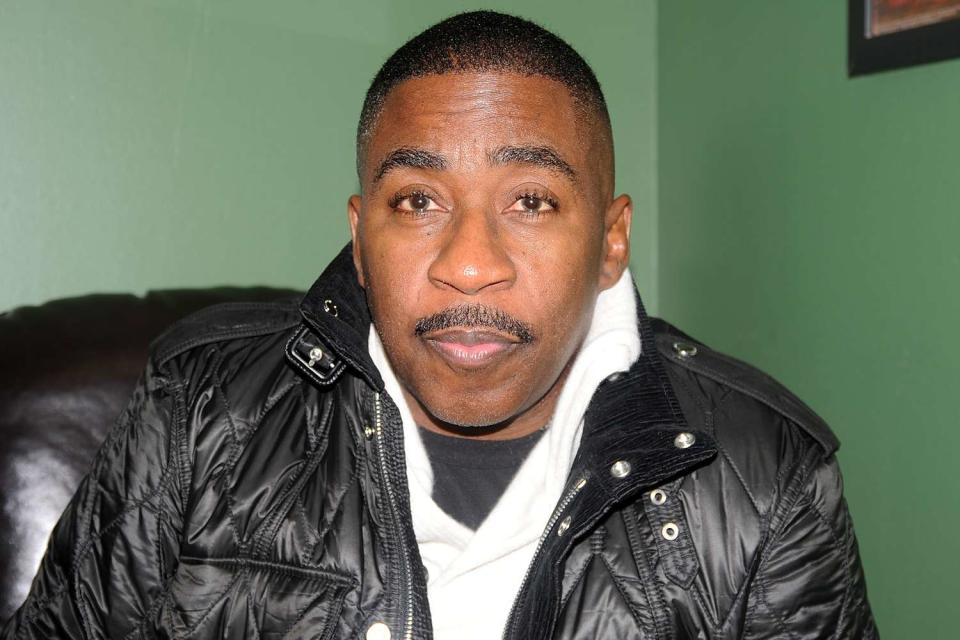Keith Robinson on Suffering 2 Strokes in 4 Years That Left Him Unable to Speak: 'I Fought Through' (Exclusive)
“From not knowing if I can even talk again to having an hour special coming out is major,” the comedian tells PEOPLE

Bobby Bank/Getty
Comedian Keith RobinsonKeith Robinson suffered two life-altering strokes in 2016 and 2020
The comedian deals with immobility on the right side and speech difficulties
He’s now opening up about his comeback in his new Netflix comedy special, Different Strokes
Keith Robinson is feeling proud of his comeback after two life-altering strokes left him struggling to speak for more than a year.
Ahead of the release of his new comedy special Different Strokes, the 50-year-old opened up to PEOPLE about suffering two strokes in less than five years and why his return to the stage means so much.
The comedian suffered his first stroke in February 2016. However, it took him some time to come to terms with it and seek medical attention. He recalls waking up one morning and the entire right side of body was “leaning.” Shrugging it off, he took some aspirin and went about his day. Robinson was later filling out some paperwork when his vision started getting blurry. When his cousin Nick started to get concerned and mentioned the possibility of a stroke, he immediately shut down the idea.
“I’m like, ‘Shut up, I’m Robinson… Robinsons don’t have no f—ing strokes.’” he quips. So, he simply took more aspirin.
As the day progressed, he still felt the right side of his body go numb at times. He also noticed his energy level was uncharacteristically low. By midnight, after a radio show appearance, it was clear that something was wrong. So a friend took him to get help. Robinson was admitted to a hospital in New York when doctor’s confirmed he was suffering a stroke.
A stroke occurs when the brain is deprived of oxygen, which either happens when there is a bleed in the brain, or in most cases, about 80 percent of the time, when plaque or a clot cuts off blood flow in an artery that leads to the brain. A stroke is a medical emergency and the longer it goes untreated, the greater the potential for brain damage and disability.

Ashley Chappell
Comedian Keith RobinsonNever miss a story — sign up for PEOPLE's free daily newsletter to stay up-to-date on the best of what PEOPLE has to offer, from celebrity news to compelling human interest stories.
Despite the medical confirmation, Robinson still wasn’t fully convinced he was having a stroke until after he spent the night in the hospital. “I wake up in the morning, and my right side is still down. And that’s when I realized and accepted, ‘Oh, I'm having a stroke.’”
The cause was his high blood pressure, which he says makes sense because he’s often neglecting his medication to manage it. “Just me being hard headed,” he admits. “I had plenty of time to get my blood pressure in check but I ignored a lot of the blood pressure medicine. So at the hospital, my blood pressure was 205/140.”
Learning that it was a minor stroke, Robinson was able to recover pretty quickly. After light rehab, he was discharged from the hospital after just a month.
“I got out in March and I was back on stage by April,” the comedian recalls, boasting that he didn’t have much lasting effects from the health emergency. “The only thing, my arm was all swollen. I didn’t have full movement. I was walking fine, a little limp but I could walk. And my voice was okay.”
“I came back so quick that my dumb brain, being hard headed again, I’m like, ‘Alright, a stroke is not that bad. I got everything back.’”
That mindset is, in part, what landed Robinson back in the hospital four years later.
Related: John Singleton Suffered a Stroke at Age 51: Why Younger People Are Having Them

Shannon Finney/WireImage
Keith RobinsonThe PEOPLE Puzzler crossword is here! How quickly can you solve it? Play now!
In 2020, the star suffered another stroke while traveling to Arizona for a tryst with a longtime friend. Excited for the trip, Robinson ordered numerous drinks on the flight and got “hammered” in first class.
“The pilot makes an announcement, 20 minutes left in the flight. Now I'm doing the math. So I pop my Viagra. When I got off the flight, once again I’m like, ‘Oh man, what’s going on?’ I wasn’t walking right,” he recalls, noting he started experiencing the same symptoms as last time. “But, truly much to my detriment, I never panicked… I wish I would sometimes.”
“So my vision is blurry, and I’m just thinking, ‘Should I go to the hospital or go to the girl’s house?’ … You can imagine which I chose,” he says with a laugh. “I went to the girl’s house.”
After spending the night, Robinson says he woke up in the morning and couldn’t even walk. The woman immediately called the ambulance and he was transported to a hospital in Phoenix where doctors confirmed he was suffering another stroke — caused again by high blood pressure and cholesterol. “This is a bad one,” he adds.
After a few days in the Phoenix, Robinson flew back home and was admitted to a hospital in New Jersey and then another in Philadelphia, where he remained for a month and a half. While there, Robinson struggled to get back on his feet. He admits that being in the hospital was “killing my mental health” because he felt as though he was restricted from making progress with his health — especially being treated in the midst of the COVID-19 pandemic.
“The hospital takes away your freedom to do,” he explains. “They treated me like I was radioactive and that was chipping away at my mental health. They have a one-size-fits-all solution to treat all stroke victims. They’ve got a protocol.”
“It was a feeling of helplessness. I called my brother and said ‘Get me out of here now.’ My mental health was so bad I couldn't stand another day.”
Related: 'NCIS' Alum Pauley Perrette Says She's 'Super Healthy' After Suffering Massive Stroke Last Year
Robinson ultimately left the hospital nearly a month earlier than he was supposed to because that isolation was taking an even bigger toll on him than his first stroke.
“First recovery was great. Everyone came to see me, my friends and family. It was a party at the hospital all the time,” he says, also noting visits from fellow comedians Wanda Sykes, Amy Schumerand Kevin Hart. “But during the pandemic, no one can come see you. Not even your family.”
“So besides how bad the treatment was, I didn’t really have anybody to fight for me. For my mental health, I had to get out of there.”
Additionally, Robinson’s second stroke was more severe and he was now dealing with life-altering disabilities. The stroke caused immobility on his right side and he uses a cane to walk. It also impacted his ability to speak.
“My voice was worse than it’s ever been,” he says. “My voice was out of commission for about two years. That was the most frustrating part. Walking, I fell a few times. But I grew up rough so the falling, I could just get back up. But the fact that I couldn't communicate properly was the hard part.”
But after being home, he was able to do more on his own and focus on his recovery while being in a better mental state, and surrounded by loved ones. “I always say the healing didn't start in the hospital. The healing started once I left the hospital after my mental health went back up,” he says. “Being home felt good but I knew there was more work to do.”
Related: Snoop Dogg's Daughter Cori Broadus, 24, Reveals She Suffered a 'Severe' Stroke

Ashley Chappell
Comedian Keith RobinsonIn addition to physical therapy and staying on top of his blood pressure and cholesterol medications, Robinson also worked with a speech pathologist with hopes of getting his voice back. “I didn't sit still and just go, ‘Oh my voice is gone. I can't perform again.’ I did my research." He ultimately purchased a device that goes into his mouth and helps his speech.
“That gave me a little bit more confidence,” he adds, sharing that he kept his hopes high that he could return to stand-up comedy. And nearly two years following his second stroke, Robinson bravely returned to the stage in March 2022 for a performance at New York City’s Comedy Cellar.
“It was so nerve wracking because I didn't know if I could complete all the sentences on stage. But I got on and did like three, four minutes. It was the best feeling ever,” he says.
After more appearances and getting his confidence back, Robinson decided to open up about his difficult recovery journey in his new Netflix comedy special, Different Strokes. He says it feels necessary to publicly address his comeback but he “wanted it to be funny, not tragic.”
“It was the elephant in the room. I want people to know just by looking, it's hard. But you got to be resilient,” he says. “It’s not easy having a stroke, and that should be known, but you gotta fight. That’s the main thing, staying resilient during the process.”
As he continues to navigate his new disabilities, Robinson tells PEOPLE that he’s been feeling really good lately. “I'm feeling great because I fought through,” he says. “And achieving that from where I was, I feel proud. My son was like, ‘Man, you bounced back.’ So from not knowing if I can even talk again to having an hour special coming out is major, especially from where I was mentally in the hospital.”
“I did it,” Robinson boasts.
Different Strokes is available now on Netflix.
For more People news, make sure to sign up for our newsletter!
Read the original article on People.


